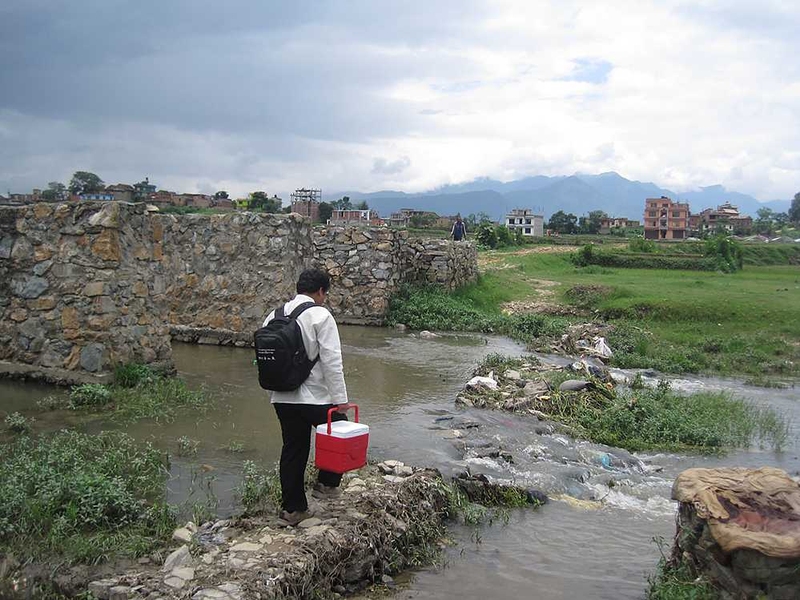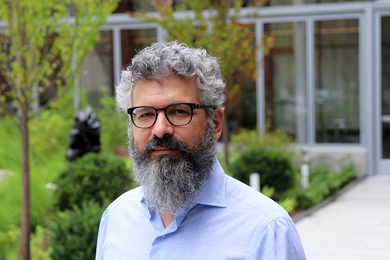D-Lab Scale-Ups, launched in 2011, piloted its acceleration platform for MIT alumni innovators and entrepreneurs last year. The fellowship program provides financial and mentoring support to entrepreneurs seeking to turn appropriate technologies into scalable and sustainable social ventures.
Scale-Ups fellowships are organized into three tracks for early, middle, and advanced stage projects. For the Phase I program — the earliest stage — fellows conduct in-depth needs and market analysis, value-chain analysis and user testing in their target market to further refine their existing prototype and work toward establishing a business model.
Shawn Wen, PortaTherm, Nepal
Shawn Wen, who graduates in June with an SB in Brain and Cognitive Sciences, won a Phase I Scale-Ups fellowship to advance the product development and testing of the PortaTherm, an affordable, effective, electricity-free diagnostic system for typhoid and paratyphoid.
While the $5,000 award will help fund the work, Shawn says, “the value of the D-Lab Scale Ups Fellowship extends far beyond seed capital. It means gaining access to incredible technical and business mentors, who have firsthand experience bridging idea and implementation. It also means learning from and sharing experiences with a community of like-minded peers at D-Lab, who are all daring and passionate enough to believe we can make a scalable and sustainable impact through our technologies.”
Shawn’s technology, the PortaTherm, addresses the urgent need for early and accurate typhoid diagnosis in rural resource limited settings: the technology is affordable to these clinics, easy to use, accurate and doesn’t require electricity. The PortaTherm marries the groundbreaking phase change incubator, invented by D-Lab founder Amy Smith, and a simple-to-read, blood culture-based diagnostic test developed by Dr. Jason Andrews of Massachusetts General Hospital.
Low- and middle-income countries not only suffer from disproportionately high rates of typhoid and paratyphoid compared to industrialized countries, but they are also poorly equipped to handle their high disease burden. The reasons why are myriad, but include lack of diagnostic equipment that is affordable, reliable and functional in areas that may lack consistent access to electricity. In Nepal, for example, where typhoid and paratyphoid are hyperendemic, none of the government health posts, which serve more than 90% of the population, have access to typhoid diagnostics.
During the fellowship period, Shawn plans to build off the success of a validation trial and market research conducted last summer, and implement the PortaTherm under operational conditions in rural Nepalese health posts. Shawn is eager to return to Nepal and the community of health workers with whom she worked last summer. “These are the people who do heroic work in their communities despite having inadequate resources. They refuse to fail their communities even though the system has failed them. I decided to push on because I can’t fail them either.”
Kevin Cedrone, Augmented Infant Resuscitator, Uganda
Phase I projects enter the program at a stage when a need and target market has been identified and a proof-of-concept prototype built and tested in the lab. Kevin Cedrone and his team built the first prototype of the Augmented Infant Resuscitator (AIR) overnight, during a hackathon conference where they learned of the need for such a device from Dr. Santorino Data, a trainer and organizer for Helping Babies Breathe in Uganda.
The technology is an inexpensive add-on device for existing emergency ventilation equipment that monitors and records resuscitation performance. Specifically, the AIR device measures ventilation rate, lung pressure and air volume and displays these statistics — along with overall ventilation performance indicators — to the operator’s laptop in real time. The most common problems the device can pinpoint are a failure of the facemask seal, blocked airways and the rate of ventilation.
A PhD candidate in mechanical engineering, Kevin will use his Scale-Ups Phase I fellowship to build the next, field-ready iteration of AIR, to conduct a clinical trial with healthcare providers and training mannequins in Uganda to assess the usability and technology acceptance of AIR as a training tool. He is looking to acquire data indicating why neonatal resuscitations fail so frequently, and identify equipment shortcomings as well as common errors in technique and instruction.
“I am excited to join the D-Lab, MIT's community that is working on global health and development issues,” he says. “It is a great opportunity for my team to gather feedback and data from actual stakeholders rather than just the existing literature. We want to sharpen our understanding of the problem of infant asphyxia and resuscitation, as it exists for doctors, trainers, birth attendants and the supply chain so we can improve our software and hardware to accelerate development now, and deployment later. D-Lab will give us more ideas and contacts than if we acted alone.”
In addition to the Scale-Ups fellowship, Kevin and the AIR team have won an MIT IDEAS Global Challenge award and 2012 First Prize for best overall innovation at the “Hacking Medicine” technology event organized by MIT and the Massachusetts General Hospital Center for Global Health, the conference where AIR got its start.
Sumana Shrestha, AutoPump, Nepal
Given that familiarity with the target market and a thorough understanding of cultural context are essential to product success, Phase I fellows are required to spend six to eight weeks in their target market during the four-month fellowship period. Sumana Shrestha, who won a Phase I fellowship for a water management device, already knows her target market, Nepal, intimately — she grew up there. Like five million people in urban Nepal, she understands what it means to guess how much water is available in reservoirs and when electricity may be available to power a pump to ensure water flow to indoor faucets. And she knows that this guesswork wastes time, electricity and water.
“I have actually lived through all the problems that AutoPump is trying to solve,” Sumana says. “But it was not until I came to the U.S. in 2003 and again in 2008 that I started questioning, ‘why does it have to be that way?’"
Sumana started talking with friends about this problem the first semester she was at the MIT Sloan School of Management. But the idea of a pump with a sensor that could detect reservoir levels and check for the availability of electricity did not materialize until she met Amit Gandhi, a D-Lab instructor and SM candidate in mechanical engineering. They got to work building the first prototype last semester and then Sumana headed to Kathmandu over January’s Independent Activities Period, where she formed a local team that built another prototype based on customer feedback.
The AutoPump, affordable and scalable, uses a sensor-based system with a central control box that will check water levels in underground and rooftop reservoirs, check for the availability of electricity, and turn the electric pump on and off according to preset criteria.
“Winning [the Scale-Ups] fellowship means I can iterate more on the prototype and perfect it further. The proof of the concept has already been done, what we need now is the funding and brain power to engineer the solution for the problem we are more familiar with and make the product such that the customers will pay for it. For me personally, I will leave with an idea I will pursue after I graduate.”
Joining the D-Lab Scale-Ups family
The Phase I fellowship runs June 1 through the end of September. This year’s Phase I Scale-Ups cohort will benefit from a new intensive three-day orientation to ensure that the fellows have access to the people and tools they need to make their projects successes. “I'm looking forward to the opportunity to get to know the cohort and working with them to refine their fellowship plans,” says Rebecca Smith, D-Labs Scale-Ups Phase I program coordinator. Shawn, Kevin and Sumana will be joining a larger community of the seven Scale-Ups fellows already participating in the Phase II and III program. Rebecca continues, “We've seen a lot of valuable knowledge sharing taking place between the current Scale-Ups fellows, and I think this aspect of the program will be a huge benefit for our earlier-stage Phase I projects.”
Located at D-Lab, MIT's fast-growing and highly regarded technology and international development program, Scale-Ups was created with generous support from Abdul Latif Jameel Community Initiatives (ALJCI), to identify and support technologies with potential for wide-scale poverty alleviation. D-Lab fosters the development of appropriate technologies and sustainable solutions within the framework of international development. D-Lab programs include 20 MIT courses, fieldwork opportunities for MIT students, research and evaluation programs, conferences and K-12 outreach.
Scale-Ups fellowships are organized into three tracks for early, middle, and advanced stage projects. For the Phase I program — the earliest stage — fellows conduct in-depth needs and market analysis, value-chain analysis and user testing in their target market to further refine their existing prototype and work toward establishing a business model.
Shawn Wen, PortaTherm, Nepal
Shawn Wen, who graduates in June with an SB in Brain and Cognitive Sciences, won a Phase I Scale-Ups fellowship to advance the product development and testing of the PortaTherm, an affordable, effective, electricity-free diagnostic system for typhoid and paratyphoid.
While the $5,000 award will help fund the work, Shawn says, “the value of the D-Lab Scale Ups Fellowship extends far beyond seed capital. It means gaining access to incredible technical and business mentors, who have firsthand experience bridging idea and implementation. It also means learning from and sharing experiences with a community of like-minded peers at D-Lab, who are all daring and passionate enough to believe we can make a scalable and sustainable impact through our technologies.”
Shawn’s technology, the PortaTherm, addresses the urgent need for early and accurate typhoid diagnosis in rural resource limited settings: the technology is affordable to these clinics, easy to use, accurate and doesn’t require electricity. The PortaTherm marries the groundbreaking phase change incubator, invented by D-Lab founder Amy Smith, and a simple-to-read, blood culture-based diagnostic test developed by Dr. Jason Andrews of Massachusetts General Hospital.
Low- and middle-income countries not only suffer from disproportionately high rates of typhoid and paratyphoid compared to industrialized countries, but they are also poorly equipped to handle their high disease burden. The reasons why are myriad, but include lack of diagnostic equipment that is affordable, reliable and functional in areas that may lack consistent access to electricity. In Nepal, for example, where typhoid and paratyphoid are hyperendemic, none of the government health posts, which serve more than 90% of the population, have access to typhoid diagnostics.
During the fellowship period, Shawn plans to build off the success of a validation trial and market research conducted last summer, and implement the PortaTherm under operational conditions in rural Nepalese health posts. Shawn is eager to return to Nepal and the community of health workers with whom she worked last summer. “These are the people who do heroic work in their communities despite having inadequate resources. They refuse to fail their communities even though the system has failed them. I decided to push on because I can’t fail them either.”
Kevin Cedrone, Augmented Infant Resuscitator, Uganda
Phase I projects enter the program at a stage when a need and target market has been identified and a proof-of-concept prototype built and tested in the lab. Kevin Cedrone and his team built the first prototype of the Augmented Infant Resuscitator (AIR) overnight, during a hackathon conference where they learned of the need for such a device from Dr. Santorino Data, a trainer and organizer for Helping Babies Breathe in Uganda.
The technology is an inexpensive add-on device for existing emergency ventilation equipment that monitors and records resuscitation performance. Specifically, the AIR device measures ventilation rate, lung pressure and air volume and displays these statistics — along with overall ventilation performance indicators — to the operator’s laptop in real time. The most common problems the device can pinpoint are a failure of the facemask seal, blocked airways and the rate of ventilation.
A PhD candidate in mechanical engineering, Kevin will use his Scale-Ups Phase I fellowship to build the next, field-ready iteration of AIR, to conduct a clinical trial with healthcare providers and training mannequins in Uganda to assess the usability and technology acceptance of AIR as a training tool. He is looking to acquire data indicating why neonatal resuscitations fail so frequently, and identify equipment shortcomings as well as common errors in technique and instruction.
“I am excited to join the D-Lab, MIT's community that is working on global health and development issues,” he says. “It is a great opportunity for my team to gather feedback and data from actual stakeholders rather than just the existing literature. We want to sharpen our understanding of the problem of infant asphyxia and resuscitation, as it exists for doctors, trainers, birth attendants and the supply chain so we can improve our software and hardware to accelerate development now, and deployment later. D-Lab will give us more ideas and contacts than if we acted alone.”
In addition to the Scale-Ups fellowship, Kevin and the AIR team have won an MIT IDEAS Global Challenge award and 2012 First Prize for best overall innovation at the “Hacking Medicine” technology event organized by MIT and the Massachusetts General Hospital Center for Global Health, the conference where AIR got its start.
Sumana Shrestha, AutoPump, Nepal
Given that familiarity with the target market and a thorough understanding of cultural context are essential to product success, Phase I fellows are required to spend six to eight weeks in their target market during the four-month fellowship period. Sumana Shrestha, who won a Phase I fellowship for a water management device, already knows her target market, Nepal, intimately — she grew up there. Like five million people in urban Nepal, she understands what it means to guess how much water is available in reservoirs and when electricity may be available to power a pump to ensure water flow to indoor faucets. And she knows that this guesswork wastes time, electricity and water.
“I have actually lived through all the problems that AutoPump is trying to solve,” Sumana says. “But it was not until I came to the U.S. in 2003 and again in 2008 that I started questioning, ‘why does it have to be that way?’"
Sumana started talking with friends about this problem the first semester she was at the MIT Sloan School of Management. But the idea of a pump with a sensor that could detect reservoir levels and check for the availability of electricity did not materialize until she met Amit Gandhi, a D-Lab instructor and SM candidate in mechanical engineering. They got to work building the first prototype last semester and then Sumana headed to Kathmandu over January’s Independent Activities Period, where she formed a local team that built another prototype based on customer feedback.
The AutoPump, affordable and scalable, uses a sensor-based system with a central control box that will check water levels in underground and rooftop reservoirs, check for the availability of electricity, and turn the electric pump on and off according to preset criteria.
“Winning [the Scale-Ups] fellowship means I can iterate more on the prototype and perfect it further. The proof of the concept has already been done, what we need now is the funding and brain power to engineer the solution for the problem we are more familiar with and make the product such that the customers will pay for it. For me personally, I will leave with an idea I will pursue after I graduate.”
Joining the D-Lab Scale-Ups family
The Phase I fellowship runs June 1 through the end of September. This year’s Phase I Scale-Ups cohort will benefit from a new intensive three-day orientation to ensure that the fellows have access to the people and tools they need to make their projects successes. “I'm looking forward to the opportunity to get to know the cohort and working with them to refine their fellowship plans,” says Rebecca Smith, D-Labs Scale-Ups Phase I program coordinator. Shawn, Kevin and Sumana will be joining a larger community of the seven Scale-Ups fellows already participating in the Phase II and III program. Rebecca continues, “We've seen a lot of valuable knowledge sharing taking place between the current Scale-Ups fellows, and I think this aspect of the program will be a huge benefit for our earlier-stage Phase I projects.”
Located at D-Lab, MIT's fast-growing and highly regarded technology and international development program, Scale-Ups was created with generous support from Abdul Latif Jameel Community Initiatives (ALJCI), to identify and support technologies with potential for wide-scale poverty alleviation. D-Lab fosters the development of appropriate technologies and sustainable solutions within the framework of international development. D-Lab programs include 20 MIT courses, fieldwork opportunities for MIT students, research and evaluation programs, conferences and K-12 outreach.






